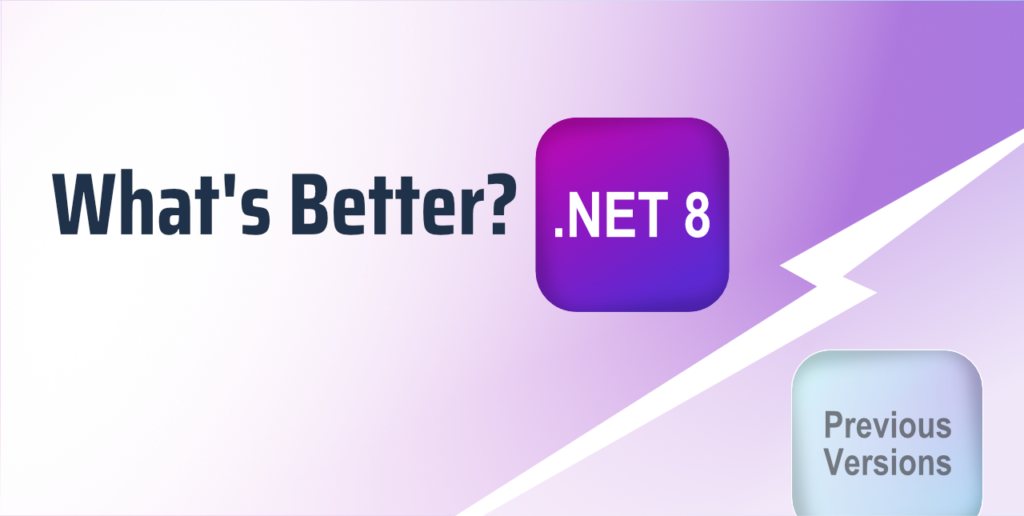Many new features .NET 8 make it a promising technology but is .NET 8 better than its earlier versions?
As advancements in custom software development and technology continue, new and updated frameworks are constantly being released to keep up with modern innovations, including AI.
Here, how can Microsoft keep its premium offering .NET lagging behind its competitors Java, Node.JS, Laravel, Python, Django, and others? Released on November 14, 2023, .NET 8 is the latest version of the .NET development platform, which assures its users of better performance and stability. Microsoft has also done some tool modifications in the latest version to enhance developer’s productivity and software development speed.
As the new version is here, developers are curious about enhancements and features. They are also at the crossroads of choosing a new version or keeping working on the previous one.
For them, this blog is a goldmine of information. We will compare .NET8 with its previous versions on key parameters helps developers choose the one that matches their requirements.
In a dynamic business environment, scalability is crucial. IT services provide the flexibility to scale up or down your resources based on changing business needs. Cloud services, for instance, allow seamless expansion of storage and computational power

Serana Belluci
Product Designer
Is .NET 8 Better Than its Previous Versions?
If it is compared to previous versions, then it is safe to say that this latest version has few new features. .NET 8 is designed for greater speed and easy structure thus, it has the following positive points compared to the old versions:

1. Performance
Regarding speed and performance, .NET 8 has far improved more than .NET 7. The two versions of the Microsoft.net system make use of a JIT (Just-In-Time) compiler. It looks at code patterns and creates highly refined machine code that runs easily on your chosen devices.
.NET 8 features a more developed garbage collection system and runtime environment. Thus, firms save considerable resources, which leads to greater efficiency even outside of rush hours.
On the Techempower JSON benchmark, .NET 8 has a powerful 18% speed boost over the previous version. Likewise, the Fortunes benchmark indicates a significant 24% rise. Memory management needs good use of assets, mainly for memory-intensive tasks. When compared to the previous versions like .NET 7 we have to admit that .NET 8 is better.
2. Cross-Platform Compatibility
Concerning multiple platform usage development, .NET 8 outsmarts .NET 7. In comparison to .NET 7, it allows you to create applications for:
1. AVX-512
2. Vector 512
3. Ideal use of WebAssembly and ARM64
These upgrades let you reach individuals across desktops and smartphones running Windows, Linux, macOS, and other platforms.
• Better Hardware Intrinsic Support: Makes use of platform-specific device guidelines to boost efficiency across various platforms (x86/x64, Arm64, and AVX-512).
• Enhanced.NET MAUI Support: Increases mobile app output and grows system reach (Windows ARM64, WebAssembly).
• Advanced WebAssembly Features: Improves user experience and compatibility with different browsers.
3. Observability and Diagnostics
In .NET 7, you need to use third-party tools, as it has features like Event Tracing for Windows (ETW) instrumentation. However, .NET 8 includes built-in support and tools for third-party APIs to track health and detect issues.
While .NET 7 had some built-in features, like Event Tracing for Windows (ETW) instrumentation, they were suited to certain cases and didn’t offer wider, complete solutions.
.NET 8 supports C# hot reload, which allows creators to change general ways and forms while fixing the .NET application. Hence, the .NET application development firm has started shifting to .NET 8 from .NET 7.
.NET 8 marks a new era in observability, offering several native features that benefit creators. Structured logging features, set up in .NET 7 and modified in .NET 8, keep precise and machine-readable records, making it simpler to study and connect across platforms.
4. Microsoft Support
Microsoft provides various support intervals for each .NET version using two main policies:
• LTS (Long-Term Support)
• STS (Short-Term Support)
LTS, or Long-Term Support, is a better option as it provides security and features and renews over a longer period, about three years. In contrast, STS lasts only one year.
The .NET 8 version has LTS backing, so Microsoft will support it from November 14th, 2023, to November 10th, 2026, unlike the Dotnet 7 version, which is going to end on May 14th, 2024. Thus, .NET 8 stands out for keeping your application well.
5. Programming Language Compatibility
With .NET 8, Microsoft improved the C# programming language. It lets creators draft simple code, keep the framework, smoothly debug, and refresh programs to suit market demands.
Meanwhile, .NET 8 removes the need for generic code. Moreover, .NET 7 has no such features and benefits, so .NET 8 again topped the list.
If your code base follows C# 10 norms, moving to .NET 7 will be quite easy. Switching to C# 12 and .NET 8 will require extra changes to code when taking advantage of the new language features. If keeping integration with a C# 10 codebase is critical, .NET 7 can be a better choice.
6. Integration Option
In .NET 7, integration requires extra time as creators have to develop particular code for APIs and other elements. Still, in .NET 8, Microsoft covered integration with major integrated development settings, APIs, and services.
On top of that, debugging features are getting better, helping in the removal of flaws and boosting process execution in a short amount of time.
Every .NET development firm has suggested its use to its clients. Built-in integration with third-party tools, faster connections, and improved C# make .NET 8 a better choice than .NET 7.
Conclusion
As we’re at the end of our blog, it’s time to give a verdict on our core blog topic. .NET 8 surely emerges as a compelling choice for developers seeking to create future-proof applications. Boasting enhanced performance, improved diagnostics, expanded cross-platform support, advanced language features, and long-term stability, are the key points making it stand out from the previous version.
By embracing .NET 8, developers can tap into the full potential of the .NET ecosystem and stay at the forefront of the rapidly evolving software industry.
Moreover, migrating from .NET 7 to .NET 8 or choosing the current version for fresh development can be a strategic decision for which reaching out to experts is recommended.



